You've likely heard terms like mental illness, psychiatric disorder, or psychological issues. These terms can sound scary or confusing. Maybe someone you know has been told they have one of these conditions. Maybe you're trying to figure out your thoughts and feelings.
Don't worry. These conditions are more common than you might think, and they can be treated. Let’s explain psychiatric disorders in clear, simple terms.
Understanding Psychiatric Disorders in Simple Terms
What Makes Something a Psychiatric Disorder
A psychiatric disorder is when your brain works differently in ways that make daily life harder. Think of your brain like a computer. Sometimes the software gets mixed up or needs an update. That doesn't mean the computer is broken forever - it just needs some help to work better.
These conditions affect how you think, feel, or act. They're not your fault, and they're not something you can "snap out of" by trying harder. Just like you can't will away a broken arm, you can't will away depression or anxiety.
Why are the terms mental illness and mental disorder often used interchangeably?
Both describe the same thing: conditions that affect your mind and emotions. Some people prefer one term over the other, but they mean basically the same thing.
Normal vs abnormal behavior can be tricky to understand. Normal behavior varies for each person. It depends on culture, age, and the specific situation. Abnormal behavior occurs when your thoughts or actions make it hard to work, attend school, keep relationships, or take care of yourself.
These conditions affect something called psychological functioning. This describes how your mind processes thoughts, manages emotions, and helps you cope daily.
Common Myths People Believe
Many people have wrong ideas about psychiatric disorders. Let's clear up some of these myths.
Some people think you can see all mental health problems on brain scans. What mental disorders show up on brain scans? Actually, most psychiatric disorders can't be seen on regular brain scans. Doctors diagnose you by talking about your symptoms. They also look at how these symptoms affect your life.
A common myth is that there’s a clear line between mental and emotional breakdowns. Both involve feeling overwhelmed and having trouble coping. The difference is usually in how long it lasts and how much it affects your daily activities.
You might have seen mental illness symbols like green ribbons or puzzle pieces. These raise awareness. Having a psychiatric disorder doesn’t mean you’re broken or need fixing. It means you're dealing with a medical condition that can be treated.
Different Types of Psychiatric Disorders
There are many different psychiatric disorders. Think of them as illnesses that affect your mind and emotions, similar to those that impact your body.
Mood Disorders That Affect How You Feel
Mood disorders change how you feel for long periods of time. Depression isn't just feeling sad for a day or two. When sadness, emptiness, or hopelessness lasts for weeks or months, it makes everything harder.
Bipolar disorder involves extreme mood swings. Sometimes you feel very happy and energetic for days or weeks. Other times, you feel very sad and low. These aren't normal ups and downs that everyone has.
What happens in the brain during a manic episode?
Your brain becomes very active, and you might feel like you have endless energy. You might not sleep much, talk very fast, or make decisions without thinking them through.
What does bipolar disorder do to the brain?
It affects the chemicals that help control your mood. With treatment, these chemical imbalances can be managed much better.
Anxiety Disorders and Worry Conditions
Everyone worries sometimes, but anxiety disorders are different. They involve worrying so much that it interferes with your daily life. You might avoid places, people, or activities because of fear.
Panic attacks are sudden and intense fears. They can cause physical symptoms like a fast heartbeat, sweating, or trouble breathing. Some people get panic disorder. They worry all the time about having another panic attack.
Phobias are extreme fears of specific things like flying, spiders, or being in crowds. The fear is so strong that people will do almost anything to avoid what scares them.
Thinking and Reality Disorders
Some psychiatric disorders affect how you understand reality. Schizophrenia is probably the most well-known of these conditions.
People with schizophrenia may hear voices that others do not hear or see things that aren't real. They might struggle to organize their thoughts. They may also believe things that aren't true.
These symptoms can be frightening. With the right treatment, many people with schizophrenia can live normal, productive lives.
Most Common Psychiatric Disorders People Ask About
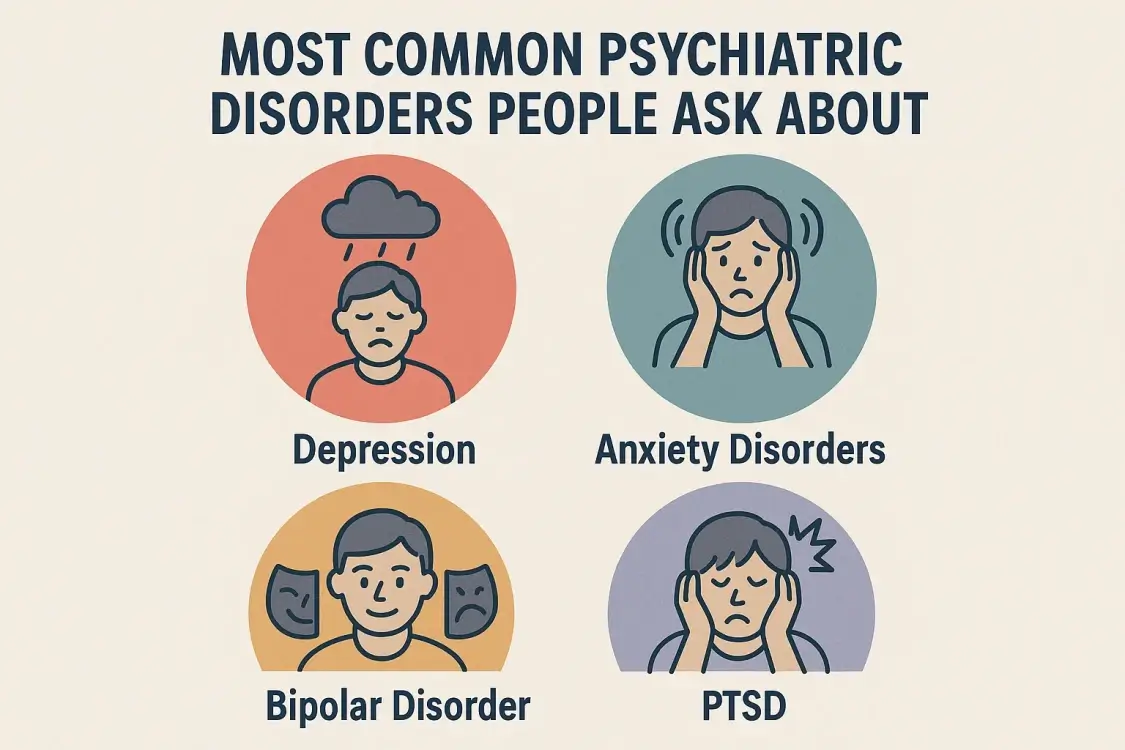
ADHD and Attention Problems
ADHD stands for Attention Deficit Hyperactivity Disorder. People with ADHD have trouble paying attention, sitting still, or controlling impulsive behavior.
This affects both children and adults. Kids with ADHD might have trouble in school because they can't focus on their work. Adults might have problems at work or in relationships.
Can ADHD cause short-term memory loss? Yes, people with ADHD often struggle to remember things. Their minds are busy and easily distracted. This isn't the same as memory loss from aging or injury.
Can untreated ADHD cause depression? Sometimes, yes. ADHD can make life tough for years. This struggle can bring frustration or feelings of failure. These feelings might lead to depression.
PTSD and Trauma Responses
PTSD stands for Post-Traumatic Stress Disorder. It happens after someone experiences or sees something very scary or dangerous.
Can trauma cause paranoia? Yes, after trauma, some people feel suspicious or scared. Their brains are trying to keep them safe from more danger.
What does a PTSD episode look like?
During a PTSD episode, someone might feel like they're reliving the traumatic event. They might have flashbacks, nightmares, or panic attacks. Their heart might race, and they might sweat or shake.
People with complex PTSD do not have a shorter life expectancy due to the condition. However, they need treatment to live their best lives. With help, most people with PTSD can recover and feel better.
Eating Disorders and Body Image Issues
Eating disorders involve unhealthy relationships with food and body image. Anorexia means severely limiting food intake. Bulimia means eating a lot of food and then trying to get rid of it. People often do this by vomiting or using laxatives.
These disorders affect both the mind and body. Someone with anorexia may have weak, brittle nails. This happens because their body aren't getting enough nutrition.
Binge eating disorder means eating a lot of food quickly and feeling unable to stop.
Borderline Personality Disorder and Related Conditions
Borderline Personality Disorder affects how someone relates to other people and manages emotions. People with BPD often have intense relationships and fear being abandoned.
There's a connection between borderline personality disorder and psychosis. What is a BPD episode like? During strong emotions, some people with BPD may briefly lose touch with reality.
Can BPD cause psychosis? In severe cases, yes. BPD psychosis symptoms can include hearing voices or feeling paranoid. However, these usually occur only during high stress.
What Causes Psychiatric Disorders
Brain Chemistry and How It Works
Your brain uses special chemicals called neurotransmitters to send messages between brain cells. When these chemicals are out of balance, it can affect your psychological functioning.
Think of these brain chemicals like mail carriers. If there aren't enough mail carriers, communication breaks down. Also, if they can't deliver messages well, it causes more problems. This is what happens in many psychiatric disorders.
During a manic episode, certain areas of the brain become overly active. The chemicals that usually help control mood and energy get out of balance.
Some people are born with brains that work differently. Others develop problems because of illness, injury, or life experiences.
Life Events and Stress Factors
Difficult life experiences can trigger psychiatric disorders in some people. This could mean losing a loved one, being in an accident, or facing violence.
Can trauma cause paranoia? Yes, when someone is hurt badly, their brain becomes more cautious about dangers. This can lead to suspicious or fearful thoughts.
There's also something called brain damage from narcissistic abuse in adults. Long-term emotional abuse can change brain function and lead to lasting effects.
Family history matters too. If your parents or grandparents had mental health issues, you might be more likely to have them too. But this doesn't mean you definitely will.
Signs that someone might have a psychiatric disorder
Changes in Daily Activities
One of the biggest signs is when someone can't do things they used to do easily. Maybe they stop going to work or school regularly. Or they might stop taking care of basic needs like eating, bathing, or cleaning.
Sleep patterns often change dramatically. Someone might sleep much more or much less than usual. Eating habits might change too - eating much more or much less than normal.
Performance at work or school usually suffers. Tasks that used to be manageable become overwhelming or impossible to complete.
Emotional and Social Warning Signs
People with developing psychiatric disorders often pull away from friends and family. They might stop enjoying activities they used to love.
Mood changes become extreme and last for weeks or months. Someone might be very sad, very angry, or very anxious for long periods.
A major warning sign is if someone mentions hurting themselves or others. This always requires immediate professional help.
How Doctors Diagnose Psychiatric Disorders
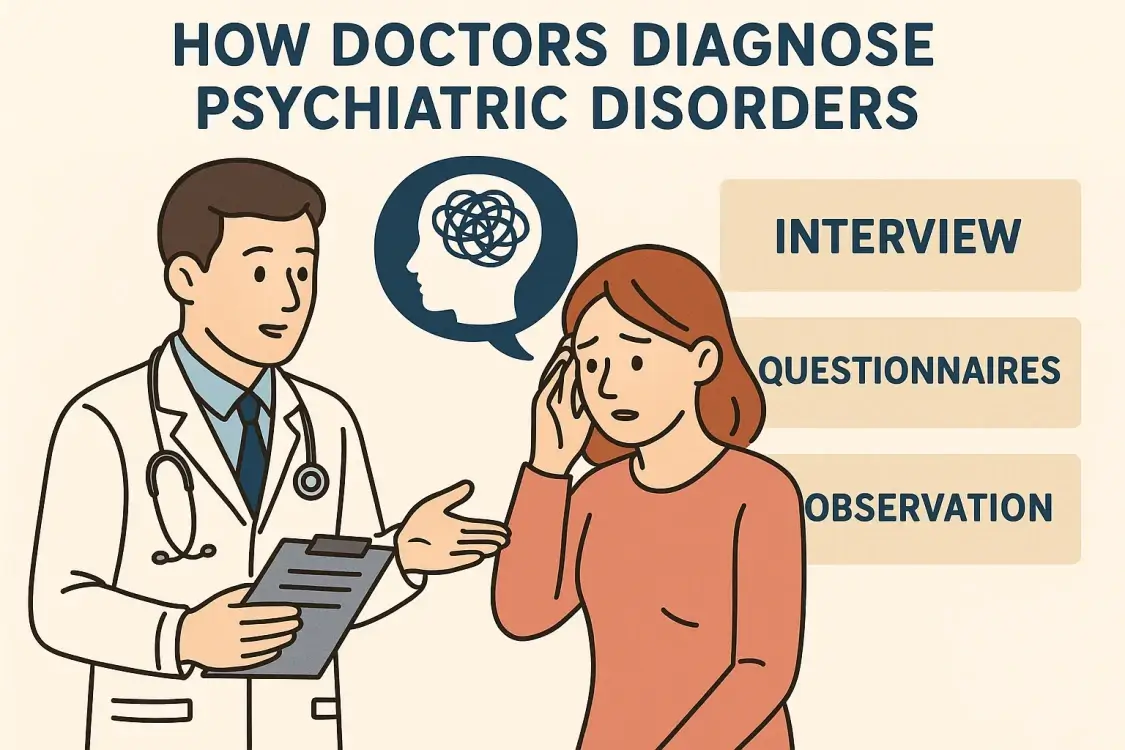
The Assessment Process
What does a psychiatric evaluation consist of? A complete evaluation involves discussing your symptoms, family history, and how issues impact your life.
The doctor will ask many questions about your thoughts, feelings, and behaviors. They might also run medical tests. This helps rule out any physical problems that could cause similar symptoms.
How long does it take a psychiatrist to diagnose? Usually, it takes several appointments over a few weeks or months. Good diagnosis takes time because doctors need to see patterns in your symptoms.
How long does a psych evaluation take? A first evaluation might take one to three hours. Follow-up appointments are usually shorter, maybe 30 to 60 minutes.
Working with Mental Health Professionals
Different types of mental health professionals can help. Psychiatrists are medical doctors who can prescribe medication. Psychologists provide therapy and testing. Social workers and counselors also provide treatment and support.
When looking for the best psychiatrist for anxiety nearby, consider their experience with your needs. Some doctors specialize in certain conditions.
Some psychiatrists focus on autism, depression, bipolar disorder, and other specific conditions. Finding the right match might take some time.
Building trust with your treatment providers is very important. You need to feel comfortable sharing personal information with them.
Treatment Options That Really Help
Therapy and Counseling Approaches
Talk therapy, also called psychotherapy, helps many people feel better. In therapy, you team up with a trained expert. Together, you explore your thoughts and feelings more deeply.
Different types of therapy work for other problems. Cognitive behavioral therapy helps you change negative thought patterns. Family therapy involves your loved ones in treatment.
Group therapy lets you connect with other people who have similar struggles. This can help you feel less alone and learn from others' experiences.
Medications When Needed
Psychiatric medications help balance brain chemicals. They don't cure psychiatric disorders, but they can reduce symptoms significantly.
Antidepressants help with depression and anxiety. Mood stabilizers help with bipolar disorder. Antipsychotic medications help with conditions like schizophrenia.
Can a psychiatrist help with weight loss? Yes, especially when weight problems are connected to psychiatric conditions. Some people gain or lose weight due to depression, anxiety, or medication side effects.
Lifestyle Support and Self-Care
Daily habits play a big role in mental health. Regular exercise, good sleep, and healthy eating all help your brain work better.
Stress management techniques like deep breathing, meditation, and yoga can reduce symptoms of many psychiatric disorders.
Having strong relationships and social support makes a huge difference in recovery. Friends and family who understand and support you are invaluable.
Living Well with Psychiatric Disorders
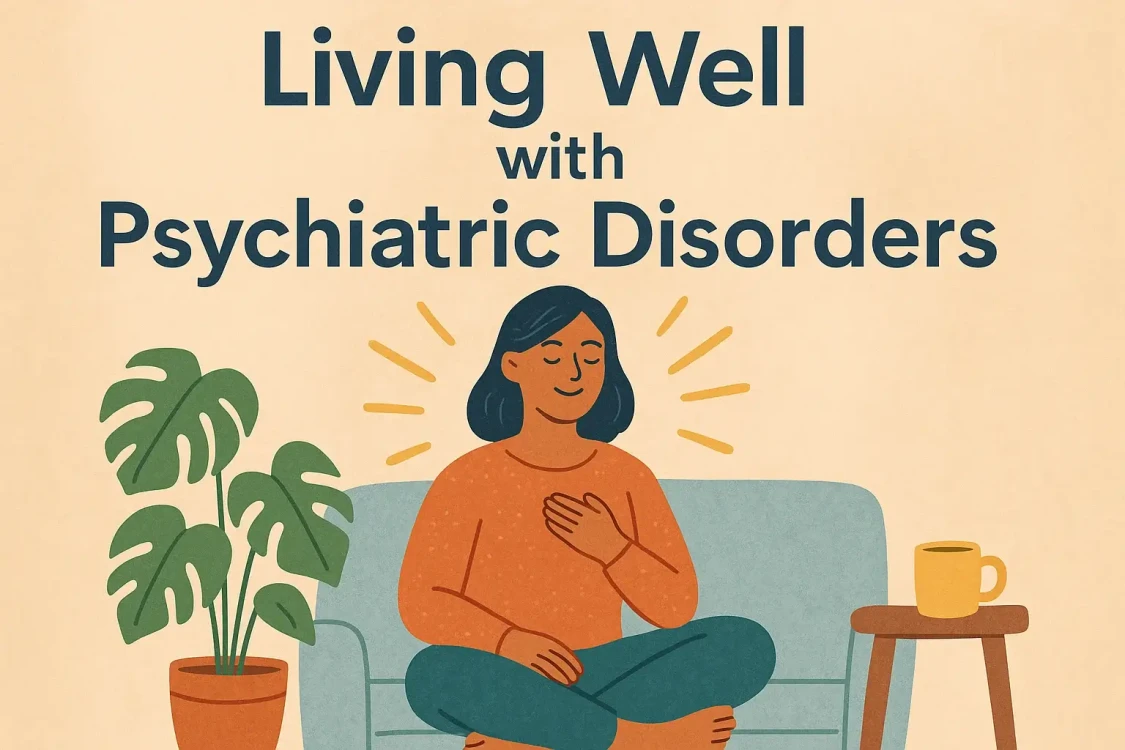
Recovery and Management
Most psychiatric disorders can be treated successfully. Recovery doesn't always mean symptoms go away. It means learning to manage them so they don't control your life.
Many people with psychiatric disorders live full, happy, productive lives. Treatment helps them develop coping skills and find the right combination of therapy and medication.
Building skills for long-term wellness takes time and practice. This may include spotting early warning signs and knowing when to get more help.
Supporting Family and Friends
If someone you care about has a psychiatric disorder, your support can make a huge difference. Learning about their condition helps you understand what they're going through.
Being patient and non-judgmental is crucial. Avoid saying things like "just think positive" or "everyone gets sad sometimes." These comments, while well-meaning, can make people feel worse.
Creating supportive environments means making your home or workplace safe. It’s a place where people feel accepted and understood.
Getting Help and Resources
When to Seek Professional Help
Get professional help if symptoms last over two weeks and affect your daily activities. Don't wait until things get really bad.
Emergencies include:
- Thoughts of suicide or hurting others
- Severe panic attacks
- Losing touch with reality
In these cases, go to an emergency room or call emergency services immediately.
Starting treatment can be scary, but mental health professionals are here to help. They've seen these conditions many times before.
Building Your Support Team
Finding qualified mental health professionals might take some research. Ask your regular doctor for referrals. You can also check with your insurance company for covered providers.
Community resources include support groups, mental health clinics, and crisis hotlines. Many communities have resources specifically for people with psychiatric disorders.
Insurance often covers mental health treatment, but coverage varies. Check with your insurance company to understand your benefits.
Remember, having a psychiatric disorder doesn't define who you are. You are a whole person who happens to be dealing with a medical condition. With proper treatment and support, you can live a fulfilling life. Mental health conditions can be treated. Millions of people manage them successfully every day.
If you or someone you know is struggling with mental health, reach out for help. Taking that first step shows strength, not weakness. Caring professionals are here to support you on your path to better mental health.

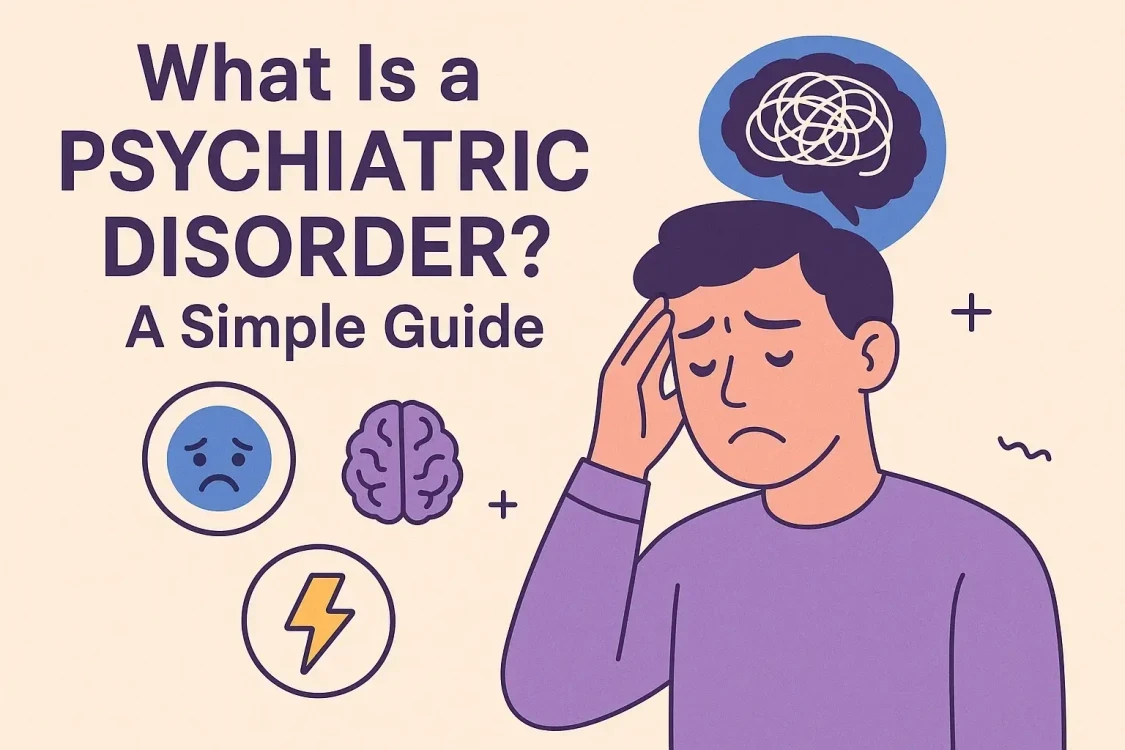
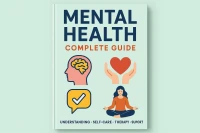
Comments